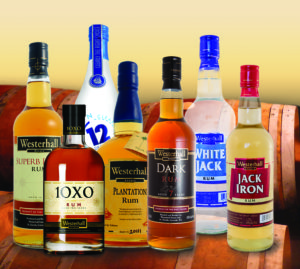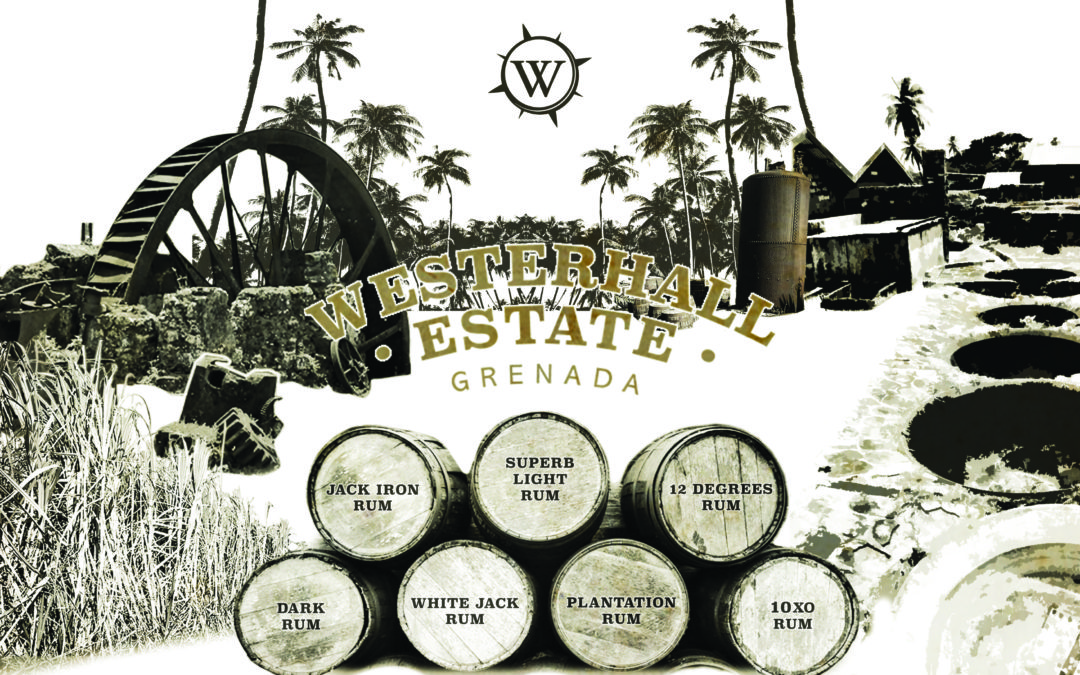“There is a call internationally for increased regulation and taxation on alcohol, including adding warning labeling requirements, instating drunk driving laws, and age limits for consumption of alcohol.
Additionally, the responsibility for alerting
One of my favorite T-shirts recently seen parading the streets, proudly states “The only thing I like more than Rum Is… More Rum!” In Grenada’s case, that translates to over 750,000 bottles produced by local manufacturers every year.
LOT OF RUM INDEED
Westerhall Estate grew Sugar Cane back in the day when Agriculture was a culture. When Graham Williams grandfather bought the estate in the 1950’s, it handily came with its own distillery.
Formalized into a company in 1966, present Managing Director Graham Williams was still a baby and seeking at that time, bottles of a different variety.
Williams declares “I started working here for my father in 1986, when we were only selling two brands of our locally produced rum, Rum Sipper and Ye Old Mill. Both rums were unaged spirits, bottled overproof. Sipper at 70%, and Old Mill at 60% alcohol by volume”
The young Williams became enamored with the fine art of blending aged rums and that continues to drive him and his company to this day and gave birth to a number of new products.
Back in 1991 due to a national scarcity of in the aged category bottled at around 40% alcohol. In this category are four aged rums 10X0, Plantation, Dark & Superb Light and one white or clear rum 12 degrees which was introduced in 2014 at Umbrela Beach Bar, Grenada’s hippest beach bar in Grand Anse.
Overproof is still the largest category locally with unaged rums bottled above 65% alcohol by volume representing over 50% of the local rum market. However, local aged rums have been gaining more acceptance and can now compete very well with the regional brands from Trinidad, Barbados and Guyana. Flavored rums are also now produced locally and like their aged counterparts they are also
sugar cane, the company took the decision to stop distilling and go into blending. Instead of making local rum stock, they began to import bulk spirit from within the Caribbean, primarily Trinidad and Barbados, this formula continues today.
Currently, the company have cuvees, two are in the over-proof category Jack Iron and White Jack at 69% alcohol. The other five are gaining local market share. Increased tourism on the island has led to growth and diversity and the local producers are taking advantage of this.
Mr. Williams on the progression of his role “I started as the Assistant Manager and I initially was working in production. I was very involved the distilling side of things, and later transferred into the blending and the developing of new products.”
Today Graham oversees the general management of the business, and you don’t have to be in Grenada very long before one of his products crosses your path. “The Company has grown significantly since 1986, he states “I still oversee product development and spearhead any new product and I continue to be the primary blender and a part of a panel that controls the blends. It’s no longer necessary for me to be involved in the actual process every time as the company is well functioning with a factory manager, marketing and sales managers. “
“Locally the rum industry in Grenada continues to be very competitive, basically it’s a wide open market by that I mean there’s no preferential treatment to local manufacturers. Mr. Williams provides the landscape. “The local rum scene players are three main companies; Grenada Distillers, Westerhall Estate and River Antoine. There are also numerous private labels on the island belonging in the “cottage type industry” category. This in Mr. Williams opinion is just frustrating the market as these labels come and go frequently, some with no stated address.
“There is very limited regulation of the industry by relevant authorities. It seems as if you want to have a rum brand, you make a label and stick it on a bottle and that’s all it takes. In terms of oversight from Government it’s very inconsistent to say the least.”
He also maintains there’s a major problem with bush rum in Grenada. “There’s a high prevalence on the island and it can be very easily purchased in the local island rum shops” Mountain Dew or Babash as it is sometimes called, has always existed, but has become more open in recent times. It seems to go hand in hand with an excise tax law that in Grenada regulated the industry and was administered by the customs department and the police. When the rate was lowered to zero in the 1980’s to help combat smuggling, the incentive to enforce the law became less and the amendments to the regulation of 2010, made oversite of production less controlled.
The previous Excise Tax Act regulated the manufactured alcohol, by defining how rum was to be produced, thus insuring that the equipment used to produced alcohol was safe, effective and properly designed. This insured that the public was protected, and that the quality of rum produced was safe to consume. Distilleries where regulated by customs and all rum produced was tested by them before it was released for public consumption. “We look forward to more regulation of the local industry to assist with insuring that better safety and sanitary conditions are enforced on the industry, and hope that the authorities will recognize that they have a responsibility to protect its citizens against the availability to potentially poisonous alcohol being available in local rum shops and bars.”
Williams is anxiously awaiting on what could be a real game changer for the industry
“There is a call internationally for increased regulation and taxation on alcohol, including adding warning labeling requirements, instating drunk driving laws, and age limits for consumption of alcohol.
Additionally, the responsibility for alerting these types of regulations to the public will fall on the Ministry of Health. “The world is obviously getting more sensitive to the effects of alcohol on society. As well as alcohol concerning diseases like diabetes, heart disease, and even cancer. So while I won’t say necessarily that I welcome the regulation, I’m not against it because we all have to be responsible for the products that we sell and it has to also bring others into line and under control.”
Drink responsibly and use alcohol in a sustainable manner. “I don’t want my customer to binge drink, I don’t want my consumer to die, I want them to be around for many years, so drink responsibly. Drink the rum and mash up the place is NOT what we want.”
With a Rum producing plant that has now reached capacity and a clear need for expansion, Williams is eying expansion of his facilities. Success for Westerhall Estates remains a moving target, “We’re at a disadvantage not being a primary producer, but we also have an advantage because we’re only limited by our own imagination. We are blenders of product and we believe we know the rum our consumers want.
With Westerhall, you can be assured the product will match the experience …and that will be Exc75ellent…but hey …Don’t take our word for it …Experience it for yourself!
P.O. Box 221, St. George’s. Grenada
Tel: 1 473 443 5477 Fax: 1 473 443 5164
Email:sales@westerhallrums.com
Web: www.westerhallrums.com

